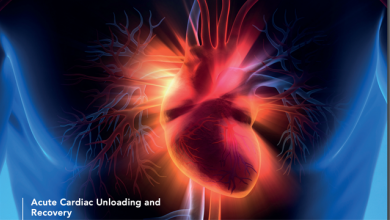Search results
Author(s):
Karl Werdan
,
Martin Russ
,
Michael Buerke
,
et al
Added:
3 years ago
Cardiogenic Shock, One of the Unresolved Problems in Cardiology
Provided the patient with acute myocardial infarction (AMI) reaches the hospital, he has a more than 90 % probability to survive.1 However, when cardiogenic shock develops, either initially or in the course of the infarction, only one in two patients is alive one year later.2,3 It really seems that all the progress in the treatment…
View more
Author(s):
Dean J Kereiakes
Added:
3 years ago
Diabetes and the associated metabolic syndrome have reached epidemic proportions in many areas of the world.1,2 Atherosclerotic cardiovascular disease has been correlated with the presence, duration and severity of diabetes.3,4 Patients with diabetes have worse clinical outcomes following presentation for acute coronary syndrome (ACS)5,6 as well as following both surgical (coronary artery bypass…
View more
Author(s):
Donald E Cutlip
Added:
3 years ago
Coronary artery disease is a major cause of morbidity and mortality among patients with diabetes.1 The presence of diabetes is associated with at least a doubling of the risk for subsequent cardiovascular disease and cardiovascular death,2–4 and the diagnosis of coronary artery disease is more difficult in patients with diabetes owing to frequent atypical symptoms or silent ischaemia. Furthermore…
View more
Author(s):
Dashdemberel Khatanbaatar
,
Surenjav Chimed
Added:
4 years ago
Eugene Braunwald
Research Area(s) / Expertise:
Job title: Distinguished Hersey Professor of Medicine, MACC
Author
Author(s):
Katrina Mountfort
Added:
3 years ago
Hypertension is one of the most important public health problems of the 21st century, with a global prevalence of around 30 %.1 In 2010, it accounted for 7.5 million deaths worldwide, representing 12.8 % of the global total.2 Furthermore, its prevalence is projected to rise to 1.5 billion hypertensive patients in 2025.3 Despite the availability of numerous safe and effective antihypertensive…
View more
Author(s):
Katrina Mountfort
Added:
3 years ago
Proceedings of Two Satellite Symposia Held at EuroPCR in May 2015 in Paris
The use of second-generation polymeric metallic drug-eluting stents (DES) in percutaneous coronary intervention (PCI) is now routine practice and has demonstrated excellent safety and efficacy compared with first-generation DES. These stents have enhanced PCI procedures, enabling the treatment of more complex lesions and…
View more
Author(s):
Didier Carrie
,
Marco Valgimigli
,
Gennaro Sardella
,
et al
Added:
3 years ago
Percutaneous coronary intervention (PCI) involving stenting is routine practice, and involves either bare metal stents (BMS) or drug-eluting stents (DES), which allow controlled release of antiproliferative drugs at the arterial waazll.1 However, the persistence of durable polymers in first-generation DES led to numerous problems including inflammation, delayed arterial healing, aneurysm…
View more
Coronary Artery Disease in SMI
Author(s):
Brian Tam To
,
Roman Roy
,
Narbeh Melikian
,
et al
Added:
12 months ago
Article
Author(s):
Adrian P Banning
,
Kristin L Hood
,
Aloke V Finn
,
et al
Added:
3 years ago
Patients with diabetes have abnormalities in the growth and function of arterial smooth-muscle and endothelial cells and consequently have a particularly aggressive and diffuse pattern of atherosclerosis, leading to increased cardiovascular complications and mortality compared with the non-diabetic population.1–4 However, the molecular signalling underlying the accelerated atherosclerosis in…
View more













